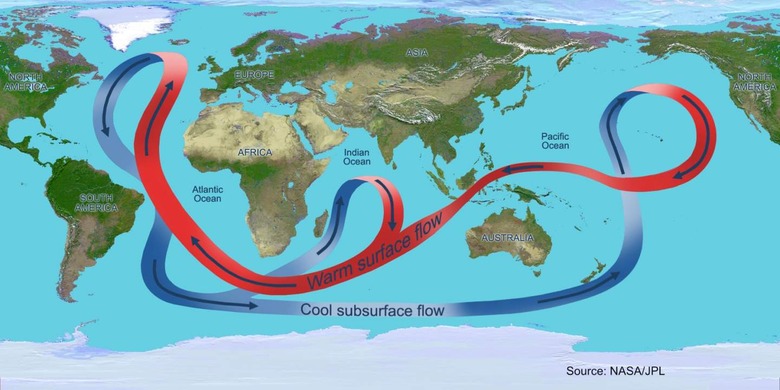Gulf Stream Crisis Study Concludes Atlantic Pessimism Fit For A Disaster Movie
New research has cast a more pessimistic outlook on a key ocean circulation, already a point of concern for environmental scientists, prompting warnings that the whole system could be headed to collapse. The Atlantic Meridional Overturning Circulation (AMOC) is instrumental in carbon sequestering that could be tempering global warming, but its the role it plays in the Earth's climate that saw it used as a plot-line in 2004 movie "The Day After Tomorrow."
Though the science in the movie wasn't exactly textbook-perfect, the theory was ominously believable nonetheless. The story describes how the North Atlantic Ocean's circulation is disrupted, causing extreme weather events and prompting a new ice age.
The AMOC is basically two flows of water, which shift heat around the globe. The surface currents, moving northward, bring heat from the tropics and the Southern Hemisphere. There, the heat is transferred to the cooler atmosphere; the water becomes denser, sinks, and then returns southward as much lower currents.
While the full extent of its impact is still being figured out, the AMOC's pattern is believed to be key in warming the Northern Hemisphere. Indeed, it's said to be responsible for up to a quarter of the northward global atmosphere-ocean heat transfer, helping avoid plummeting temperatures in Northwest Europe. It's also believed to be the largest carbon sink in the Northern Hemisphere, a vital part of balancing global warming.

Now, a new study from the Potsdam Institute for Climate Impact Research in Germany has added a new – and pessimistic – spin on the matter. Published in Nature Climate Change, it focuses on one of the lingering mysteries of the AMOC: whether the changes observed in recent years are a part of a regular pattern, or something more ominous.
"The Atlantic Meridional Overturning really is one of our planet's key circulation systems," Niklas Boers, study author, explains. "We already know from some computer simulations and from data from Earth's past, so-called paleoclimate proxy records, that the AMOC can exhibit – in addition to the currently attained strong mode – an alternative, substantially weaker mode of operation. This bi-stability implies that abrupt transitions between the two circulation modes are in principle possible."
Earlier research from the past few years had suggested the AMOC is at its weakest in over a millennium. The uncertainty, though, was whether that was down to a change in the mean circulation state or – more worrying – a failure in the dynamical stability. If it's the latter, Boers warns, it would "imply that the AMOC has approached its critical threshold, beyond which a substantial and in practice likely irreversible transition to the weak mode could occur."
Unfortunately, though long-term observations have not been made, examination of the sea-surface temperature and salinity patterns in the Atlantic Ocean indicate it is indeed stability which is to blame.
"The findings support the assessment that the AMOC decline is not just a fluctuation or a linear response to increasing temperatures but likely means the approaching of a critical threshold beyond which the circulation system could collapse," Boers concludes.
The disruption could have a huge impact on climate change, and it's also climate change which is blamed for the AMOC's struggle in the first place. While there are believed to be multiple factors involved, things like the melting Greenland ice sheet and an increase in sea-ice melt means an uptick in freshwater. Since that's lighter than saltwater, it cuts the amount of cool water sinking that's a key element of the AMOC's pattern.
As for how quickly that might reach a state where we'll notice unmistakable changes in Earth's weather and climate generally, that's still unknown. Although a "The Day After Tomorrow" style sudden freeze isn't going to happen, closer monitoring of how the Atlantic Meridional Overturning Circulation is being upended is required, the researchers say, if we're to predict just how soon bigger problems might arrive.
